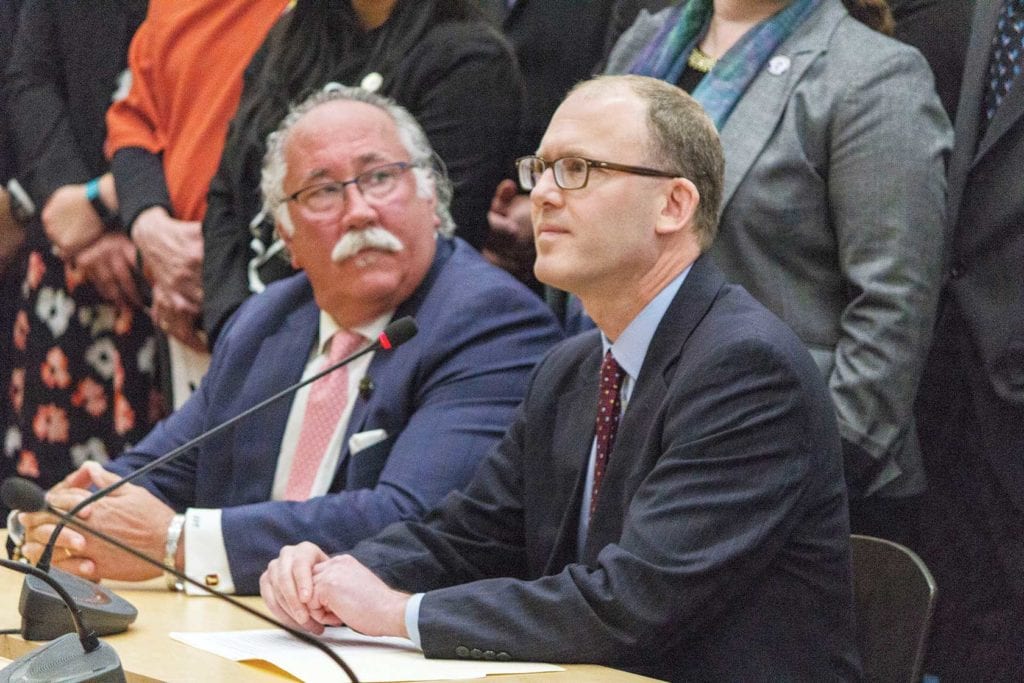
An amendment to the state constitution that would create an additional tax on Massachusetts’ highest incomes received wide support from activists, legislators and the public at a State House hearing last week.
Hundreds came to testify at the Thursday morning Committee on Revenue hearing for the Fair Share Amendment, which is sponsored by Sen. Jason Lewis and Rep. James O’Day. The amendment would create a 4 percent tax on the portion of an individual’s income over $1 million, potentially raising approximately $2 billion to be used for transportation and public education in the state.
“Although our working families would benefit greatly from investments in our education system and our transportation system, the reality is they cannot afford to pay higher taxes to fund these investments,” Lewis said at the hearing. “Super-wealthy families can afford to pay slightly higher taxes and continue living in the great state of Massachusetts.”
Lewis went on to explain that the highest earners in the state actually pay a lower share of their wages in income taxes than those at the lowest end of the spectrum, something he called an “upside-down tax system.”
The amendment was previously brought as a citizen’s initiative in 2015, when it received over 150,000 signatures, and passed constitutional conventions in 2016 and 2017 before being struck down by the state’s Supreme Judicial Court after a lawsuit filed by Massachusetts business groups. To pass this time around, the amendment would have to pass the constitutional conventions in the 2019-2020 and 2021-2022 legislative sessions before being placed on the November 2022 ballot.
School funding
Activists from around the state voiced their support for the amendment. Alex Hoyt, a Hudson middle school teacher, told the committee that he had seen the difference between the schools there and in Worcester, where he used to teach, and where schools had far fewer resources. He compared Worcester, where he was allowed one 500-sheet pack of paper every two weeks, to Hudson, where the district has its own copy center with relatively unlimited resources, but even with its higher funding the district has had to make cuts and layoffs.
“Year after year, our schools have been told to get by without, and yet we still rank among the best in the nation,” Hoyt said. “No millionaire risks sliding down the ladder of opportunity because 4 percent of their income after their first million is redistributed to schools serving families who may not ever make that 4 percent. But what could it mean for the children in those families?”
Other testimony focused on the state’s lacking transportation system, and criticized the MBTA for its recently announced fare hikes which have not, many riders say, matched any concurrent improvements in service.
Outside of the range of the T and the commuter rail, as well, users of regional transit systems are disappointed in the lack of public transit and connection between these systems.
“Lack of adequate public transportation limits the job and educational opportunities of those who depend on public transit to get from one place to another,” said Sabrina Davis, an organizer with the Coalition for Social Justice in Fall River. “None of the regional transit authorities in the state connect to one another. You can imagine how limiting that is when you are trying to climb that ladder.”
Not all testimony was in support of the amendment. Representatives from the Massachusetts High Technology Council, the National Federation of Independent Business and the Associated Industries of Massachusetts, all of whom were plaintiffs in the lawsuit against the original iteration of the Fair Share Amendment, spoke against it, saying that it would hurt not just large corporations but small business owners.
“The proponents of this initiative claim they are targeting high-income earners, but small, independent entrepreneurs and main street businesses would be hit by this tax surcharge,” said Christopher Carlozzi, state director of the NFIB in Massachusetts. “About 75 percent of all businesses, mostly smaller ones, pay their business taxes through their personal income tax filings, making them subject to this tax even if they are just middle-income earners.”
However, Rep. Susannah Whipps, a member of the Committee on Revenue, disagreed with this, saying that as a small business owner, she expects to pay higher taxes than her employees.
“Do you expect us to tax the poor?” she asked.






